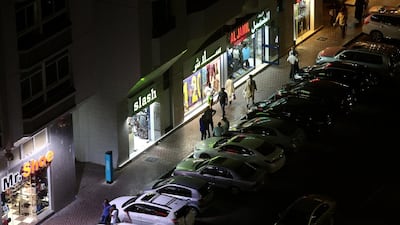ABU DHABI // Every evening when business winds down around Hamdan Street in the capital, activity on the pavements outside the shopfront windows is just beginning.
The area’s daytime pedestrian traffic of residents and shop patrons around Abu Dhabi’s oldest mall is gradually replaced by “ladies of the night” and their potential customers.
Huddling in groups of two or three, the women walk the streets, eyeing men passing by and openly negotiating prices with their clients, the bulk of whom are workers who arrive in groups of up to 15.
Residents and shopkeepers said that, despite regular police raids, the continued presence of these women discouraged people from walking in the area at night. Merchants said the open trade was not only bad for business but also made it impossible to walk comfortably in the area.
One salesman said it was something he faced every night after he closed his shop.
“It’s a problem for us. They try to grab us on our way out,” said Mohammed Adib, 27, an Indian who has worked in the centre for six years. “It’s not good for business; I would not want to bring my family here.”
With more traffic at weekends, Mr Adib said dozens of women would solicit on the pavement outside his shop with up to 60 men vying for their business.
“Ninety-nine per cent of the guys are not from here – they come from other parts of the city looking for these women.”
Mr Adib said the streets had cleared after some arrests but the respite was short-lived.
Naema Mustafa, a 25-year-old Palestinian housewife, said police on Sunday arrested members of a prostitution ring in a building on Khalifa Street near where she live. Residents were told police found that four floors were being used to run prostitution and massage activities.
An unnamed police source confirmed that the raid took place. He said that police regularly conducted raids in hot spots for street prostitution – including one on Hamdan Street last week and another on Monday night.
Chief Justice Mustafa Abu El Naja, head of an Abu Dhabi appeals court, said he received about 20 cases involving about 100 defendants a year, most of whom were caught in Al Zahiyah area and on street corners.
Mr El Naja said they were usually illegal immigrants whose tourist or work visas had expired, and who offered sex services to earn an income. Most defendants he dealt with in court were from China, Africa or former Soviet Union countries, he said.
Courts no longer charge them with prostitution because when they are caught negotiating in the street, there is not enough evidence they will commit a full prostitution offence, he said. They were instead charged with soliciting immorality – a lesser offence punished by a jail sentence of six months to three years, followed by deportation.
The night-time activities, however, make residents and visitors reluctant to spend time on the streets during the evening.
Jimyr Marbella, 42, said he did not know what to tell his sons of seven and eight – when they asked him what the women were doing. “When I take them to Burger King on that corner and they see the ladies, they ask me what they are doing,” said the broker, who has lived in the area for four years.
Mr Marbella said the scene was one he did not want his wife, sister, mother or sons to witness.
“It’s been like this since I first moved here. I haven’t seen it as much lately because I avoid going out there at night but it is always there,” he said.
After repeated harassment by pimps, another Abu Dhabi resident – an Indian who has lived in the capital for 30 years – said he now tried to avoid the area.
“They would grab my arm, even if I was with my wife,” he said.
“I used to go often, whether it was for shopping or taking my wife to the cinema, but now it is too much of a nuisance.”
tsubaihi@thenational.ae
hdajani@thenational.ae

